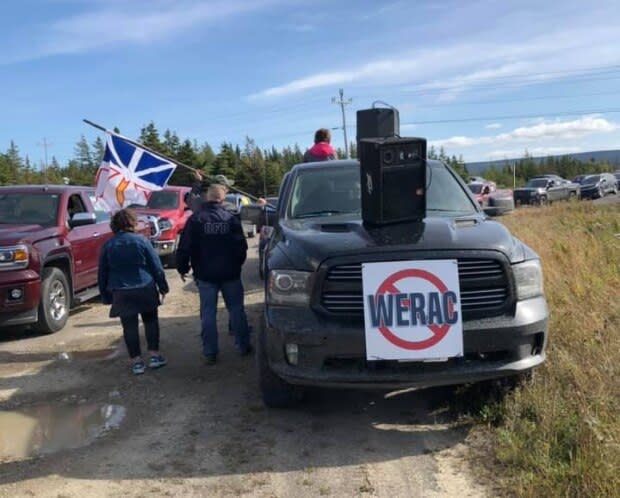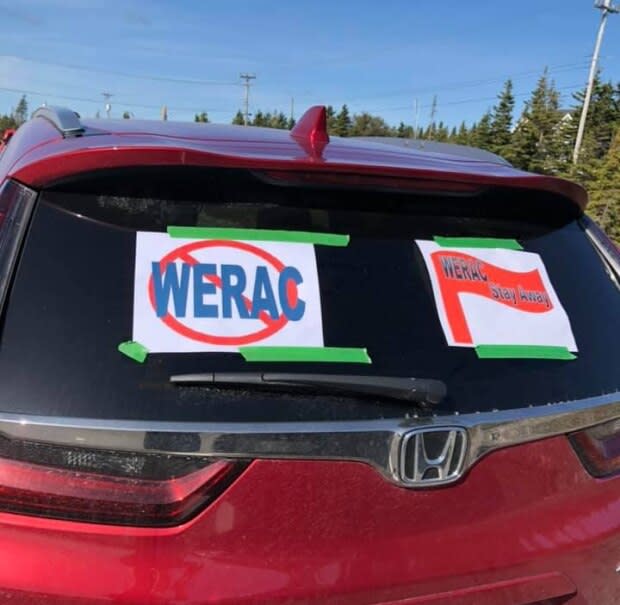Proposed wilderness protection plan spurs protest on Northern Peninsula

About 100 vehicles gathered in Plum Point on the Northern Peninsula on Saturday to protest a conservation group's plan to protect some of the area's wilderness and ecological hubs.
In May, the Wilderness and Ecological Reserves Advisory Council (WERAC) released its intended conservation plan for public feedback. The plan only covers the island portion of the province, with 10 of 32 proposed reserves falling on the Northern Peninsula.
Since the initial release of the plan, tension has grown between some residents of the area and WERAC, particularly over large pieces of land which could be used for development and a sustained future for the region, according to Shelia Fitzgerald, mayor of Roddickton-Bide Arm and president of Municipalities Newfoundland and Labrador.
"We are in desperate need of economic growth and development," Fitzgerald told CBC News.
"That land that they've identified, there's mining potential there, our forestry sector, which right now is dormant, [could benefit], so once that land is protected those opportunities for the future are basically being taken away."
In a media release issued Thursday, WERAC defended its proposal to protect large portions of land.
"Studies have shown that bigger reserves with few roads work better to protect wildlife and wildlife habitats. Similarly, whole watersheds are a better protection of water quality and freshwater ecosystems, such as spawning habitat for Atlantic salmon," the media release reads.

Fitzgerald said the Northern Peninsula has a higher rate of out-migration than any other part of the province.
Without opportunities for work in the area, many students leave after finishing school to look for work elsewhere, she said.
"The Great Northern Peninsula has so many opportunities. We've got the fishery, the forestry and most importantly we've got the land up here," said Fitzgerald.
"Now it feels like the government is coming in — or WERAC is coming in — to say 'we want to take that.'"
A way of life
Further, some 3,400 people are members of a Facebook group aimed at stopping WERAC's plan to protect areas of the Northern Peninsula.
Many people are worried they will be losing areas long used for recreational activities, such as snowmobiling and hunting.
Fitzgerald said full protection of the land means infringing on the lifestyles of residents by preventing hunting and gathering wild berries, along with chopping wood for winter heating.

WERAC's proposal does allow for some activity, but it depends on the site and is subject to conditions. Existing cabins, for example, can be grandfathered in.
In another media release, this time on Friday, WERAC said, "The plan also seeks to protect people's access to the areas and the traditional activities they currently enjoy. Without a plan, such access could be threatened in the future by industrial development."
Fitzgerald said the protest group isn't anti-conservation, rather the majority already protects the land themselves.
"That land is so pristine because the people here respect, conserve and protect the land. That's why it looks the way it does," she said.
"We don't need somebody else to come in here and protect a piece of land that we are very protective of already."
However, WERAC said without a plan, road construction and small but incremental development can cause "fragmentation of habitat over time."
"The integrity of our most pristine areas can be lost quickly and when least expected," WERAC said.
Before anything is set in stone however, the provincial government will have the final say. WERAC acts as an advisory body.
Public feedback on the report is open until Oct. 1.
WERAC said now is the time for people to comment on how they value the proposed areas of conservation and the activities they wish to continue doing.
"Should government decide to move forward into Phase 2, further consultation will be required, at which time the boundaries can be significantly altered based on public input."
Read more articles from CBC Newfoundland and Labrador


